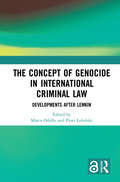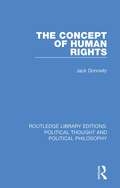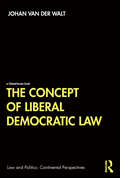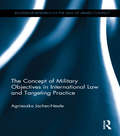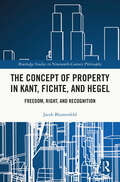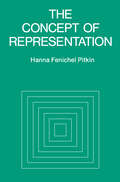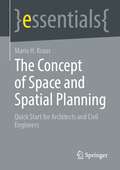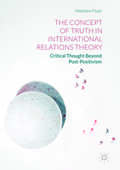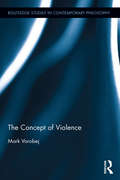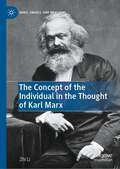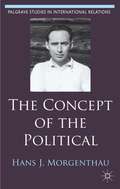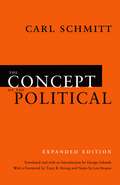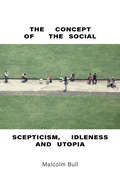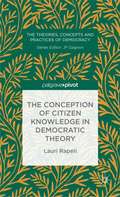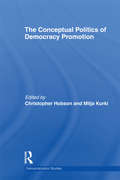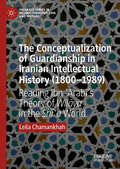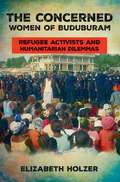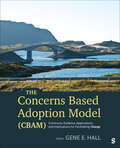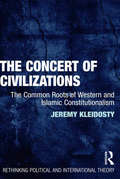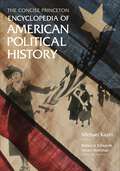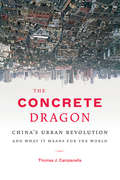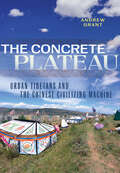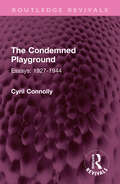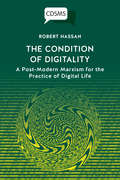- Table View
- List View
The Concept of Genocide in International Criminal Law: Developments after Lemkin
by Marco OdelloThis book presents a review of historical and emerging legal issues that concern the interpretation of the international crime of genocide. The Polish legal expert Raphael Lemkin formulated the concept of genocide during the Nazi occupation of Europe, and it was then incorporated into the 1948 Convention on the Prevention and Punishment of the Crime of Genocide. This volume looks at the issues that are raised both by the existing international law definition of genocide and by the possible developments that continue to emerge under international criminal law. The authors consider how the concept of genocide might be used in different contexts, and see whether the definition in the 1948 convention may need some revision, also in the light of the original ideas that were expressed by Lemkin. The book focuses on specific themes that allow the reader to understand some of the problems related to the legal definition of genocide, in the context of historical and recent developments. As a valuable contribution to the debate on the significance, meaning and application of the crime of genocide the book will be essential reading for students and academics working in the areas of Legal History, International Criminal Law, Human Rights, and Genocide Studies.
The Concept of Human Rights (Routledge Library Editions: Political Thought and Political Philosophy #19)
by Jack DonnellyFirst published in 1985. In this study, Donnelly distinguishes between "having a right" and "being right" and elaborates the distinction with great subtlety to show that rights have to be understood as action and not as a possession. This is done with such clarity and good sense that he is able to cast light on all aspects of the often confusing discussions of the natures and usages of "right". He illuminates an astonishing range of issues, from the limitations of Thomist and utilitarian conceptions of right to the confusions of many present-day defenders of rights, both in the West and the Third World. As importantly, Donnelly is centrally concerned with the human aspect of "human rights". He is thus able to rest his discussion of rights on a plausible philosophical anthropology as well as an appreciation of an historical dimension to human rights, and, at the end of his book, is able to open the door towards potential new developments in the discussion of human rights. Down the path he points us lies a reconciliation of the notion of individual rights with that of political community. This title will be of great interest to students of politics and philosophy.
The Concept of Liberal Democratic Law (Law and Politics)
by Johan van Der WaltThis book develops a historical concept of liberal democratic law through readings of the pivotal twentieth century legal theoretical positions articulated in the work of Herbert Hart, Ronald Dworkin, Duncan Kennedy, Rudolf Smend, Hans Kelsen and Carl Schmitt. It assesses the jurisprudential projects and positions of these theorists against the background of a long history of European metaphysics from which the modern concept of liberal democratic law emerged. Two key narratives are central to this history of European political and legal metaphysics. Both concern the historical development of the concept of nomos that emerged in early Greek legal and political thought. The first concerns the history of philosophical reflection on the epistemological and ontological status of legal concepts that runs from Plato to Hobbes (the realist-nominalist debate as it became known later). The second concerns the history of philosophical and political discourses on law, sovereignty and justice that starts with the nomos-physis debate in fifth century Athens and runs through medieval, modern and twentieth century conceptualisations of the relationship between law and power. Methodologically, the reading of the legal theoretical positions of Hart, Dworkin, Kennedy, Smend, Kelsen and Schmitt articulated in this book is presented as a distillation process that extracts the pure elements of liberal democratic law from the metaphysical narratives that not only cradled it, but also smothered and distorted its essential aspirations. Drawing together key insights from across the fields of jurisprudence and philosophy, this book offers an important and original re-articulation of the concept of democratic law.
The Concept of Military Objectives in International Law and Targeting Practice (Routledge Research in the Law of Armed Conflict)
by Agnieszka Jachec-NealeThe concept that certain objects and persons may be legitimately attacked during armed conflicts has been well recognised and developed through the history of warfare. This book explores the relationship between international law and targeting practice in determining whether an object is a lawful military target. By examining both the interpretation and its post-ratification application this book provides a comprehensive analysis of the definition of military objective adopted in 1977 Additional Protocol I to the four 1949 Geneva Conventions and its use in practice. Tackling topical issues such as the targeting of TV and radio stations or cyber targets, Agnieszka Jachec-Neale analyses the concept of military objective within the context of both modern military doctrine and the major coalition operations which have been undertaken since it was formally defined. This monograph will be of great interest to students and scholars of international law and the law of armed conflict, as well as security studies and international relations.
The Concept of Property in Kant, Fichte, and Hegel: Freedom, Right, and Recognition (Routledge Studies in Nineteenth-Century Philosophy)
by Jacob BlumenfeldThis book provides a detailed account of the role of property in German Idealism. It puts the concept of property in the center of the philosophical systems of Kant, Fichte, and Hegel and shows how property remains tied to their conceptions of freedom, right, and recognition. The book begins with a critical genealogy of the concept of property in modern legal philosophy, followed by a reconstruction of the theory of property in Kant’s Doctrine of Right, Fichte’s Foundations of Natural Right, and Hegel’s Jena Realphilosophie. By turning to the tradition of German Rechtsphilosophie, as opposed to the more standard libertarian and utilitarian frameworks of property, it explores the metaphysical, normative, political, and material questions that make property intelligible as a social relation. The book formulates a normative theory of property rooted in practical reason, mutual recognition, and social freedom. This relational theory of property, inspired by German Idealism, brings a fresh angle to contemporary property theory. Additionally, it provides crucial philosophical background to 19th century debates on private property, inequality, labor, socialism, capitalism, and the state. The Concept of Property in Kant, Fichte, and Hegel will appeal to scholars and advanced students interested in 19th Century German philosophy, social and political philosophy, philosophy of law, political theory, and political economy.
The Concept of Representation
by Hanna F. PitkinBeing concerned with representation, this book is about an idea, a concept, a word. It is primarily a conceptual analysis, not a historical study of the way in which representative government has evolved, nor yet an empirical investigation of the behavior of contemporary representatives or the expectations voters have about them. Yet, although the book is about a word, it is not about mere words, not merely about words. For the social philosopher, for the social scientist, words are not "mere"; they are the tools of his trade and a vital part of his subject matter. Since human beings are not merely political animals but also language-using animals, their behavior is shaped by their ideas. What they do and how they do it depends upon how they see themselves and their world, and this in turn depends upon the concepts through which they see. Learning what "representation" means and learning how to represent are intimately connected. But even beyond this, the social theorist sees the world through a network of concepts. Our words define and delimit our world in important ways, and this is particularly true of the world of human and social things. For a zoologist may capture a rare specimen and simply observe it; but who can capture an instance of representation (or of power, or of interest)? Such things, too, can be observed, but the observation always presupposes at least a rudimentary conception of what representation (or power, or interest) is, what counts as representation, where it leaves off and some other phenomenon begins. Questions about what representation is, or is like, are not fully separable from the question of what "representation" means. This book approaches the former questions by way of the latter.
The Concept of Space and Spatial Planning: Quick Start for Architects and Civil Engineers (essentials)
by Mario H. KrausSpace is an ambiguous and sometimes controversial term. Spatial planning is based on a delicate and changeable social balance, which is reflected in the legal basis (with German law code as example) and everyday implementation. In this essential, approaches from phenomenology are used to classify the various concepts of space.
The Concept of Truth in International Relations Theory
by Matthew FluckThis book charts the role played by conceptions of truth in the development of a critical tradition of International Relations theory. Providing a detailed account of the conceptions which have shaped the work of Critical Theorists and Poststructuralists, the book reaffirms the importance of epistemic reflection for the discipline. It argues that the partially abstract character of the main strands of critical IR arises not from their concern with epistemic matters, but from their insistence that truth is purely intersubjective. Drawing on the philosophy of Theodor Adorno, the book argues that IR's critical tradition can be rejuvenated by combining its original politicisation of truth with a critical account of its 'objectivity'. The book will be a valuable resource for scholars and graduate students interested in the future of critical International Relations theory.
The Concept of Violence (Routledge Studies in Contemporary Philosophy)
by Mark VorobejThis study focuses on conceptual questions that arise when we explore the fundamental aspects of violence. Mark Vorobej teases apart what is meant by the term ‘violence,’ showing that it is a surprisingly complex, unwieldy and highly contested concept. Rather than attempting to develop a fixed definition of violence, Vorobej explores the varied dimensions of the phenomenon of violence and the questions they raise, addressing the criteria of harm, agency, victimhood, instrumentality, and normativity. Vorobej uses this multifaceted understanding of violence to engage with and complicate existing approaches to the essential nature of violence: first, Vorobej explores the liberal tradition that ties violence to the intentional infliction of harm, and that grows out of a concern for protecting individual liberty or autonomy. He goes on to explore a more progressive tradition – one that is usually associated with the political left – that ties violence to the bare occurrence of harm, and that is more concerned with an equitable promotion of human welfare than with the protection of individual liberty. Finally, the book turns to a tradition that operates with a more robust normative characterization of violence as a morally flawed (or forbidden) response to the ontological fact of (human) vulnerability. This nuanced and in-depth study of the nature of violence will be especially relevant to researchers in applied ethics, peace studies and political philosophy.
The Concept of the Individual in the Thought of Karl Marx (Marx, Engels, and Marxisms)
by Zhi LiThis book reconstructs the concept of the individual in Marx as the key to a fresh interpretation of Marxian philosophy. Marx moved from an examination of the contingency and indeterminacy of individual consciousness in his early years to a critique of the atomistic individual and materialised social relations in his later years. His thought proposes that ‘real individuals’ are the basis for an understanding of human society that promotes the emancipation of humankind. Marx’s philosophy has often been misunderstood as lacking a concept of the individual. In China, this misunderstanding not only relates to cultural and linguistic particularities (the word ‘individual’ is seldom used in Chinese), but also relates to a misleading view of socialism and communism. This book helps remedy this misunderstanding and draws important comparisons and contrasts between Marx’s concept of the individual with that of liberalism, and between Western and Eastern Marxism.
The Concept of the Political
by Hartmut Behr Felix RöschA growing interest in the oeuvre of Hans J. Morgenthau and in re-readings of 'classical realism' increases the significance of his European, pre-emigration writings in order to understand the work of one of the founding figures of IR. This book is the first English translation of Morgenthau's French monograph La notion du politique from 1933 (translated by Maeva Vidal).
The Concept of the Political: Expanded Edition (None Ser.)
by Carl SchmittIn this, his most influential work, legal theorist and political philosopher Carl Schmitt argues that liberalism’s basis in individual rights cannot provide a reasonable justification for sacrificing oneself for the state—a critique as cogent today as when it first appeared. George Schwab’s introduction to his translation of the 1932 German edition highlights Schmitt’s intellectual journey through the turbulent period of German history leading to the Hitlerian one-party state. In addition to analysis by Leo Strauss and a foreword by Tracy B. Strong placing Schmitt’s work into contemporary context, this expanded edition also includes a translation of Schmitt’s 1929 lecture “The Age of Neutralizations and Depoliticizations,” which the author himself added to the 1932 edition of the book. An essential update on a modern classic, The Concept of the Political, Expanded Edition belongs on the bookshelf of anyone interested in political theory or philosophy.
The Concept of the Social: Scepticism, Idleness and Utopia
by Malcolm BullFrom here to utopia, new directions in political theoryWhat does political agency mean for those who don't know what to do or can't be bothered to do it? This book develops a novel account of collective emancipation in which freedom is achieved not through knowledge and action but via doubt and inertia.In essays that range from ancient Greece to the end of the Anthropocene, Bull addresses questions central to contemporary political theory in novel readings of texts by Aristotle, Machiavelli, Marx, and Arendt, and shows how classic philosophical problems have a bearing on issues like political protest and climate change. The result is an entirely original account of political agency for the twenty-first century in which uncertainty and idleness are limned with utopian promise.
The Conception of Citizen Knowledge in Democratic Theory
by Lauri RapeliWhat according to democratic theorists should the ordinary citizen know about politics? What does several decades of empirical research about citizens' political knowledge tell us? And why should we care? This book offers a comprehensive outline of the vast literature on political knowledge and by providing an analytical framework for its studying
The Conceptual Politics of Democracy Promotion (Democratization Studies)
by Milja Kurki Christopher HobsonHow do different meanings of the concept of ‘democracy’ operate in democracy promotion? How do conceptual decisions influence real political events? How is policy and reflection on democracy promotion shaped by the way different practitioners and scholars understand democracy? The Conceptual Politics of Democracy Promotion explores the way in which the meaning, content and context of ‘democracy’ are interpreted by different actors in democracy promotion, and how these influence political decisions. Introducing a theoretically new approach to the study of democracy promotion, the volume shows how the alternate ways that democracy can be understood reflects specific interpretations of political and normative ideals, as well as being closely tied to social power relations, interests, and struggles between political actors. With original contributions from some of the most prominent specialists on democracy promotion and democratization, the book examines a number of concrete cases of democracy promotion and contestation over democracy’s meaning. Re-examining democracy promotion at its time of crisis, this book will be of interest scholars and students of democracy and democratization, politics and international relations, international law, development studies and political theory.
The Conceptualization of Guardianship in Iranian Intellectual History: Reading Ibn ʿArabī’s Theory of Wilāya in the Shīʿa World (Palgrave Series in Islamic Theology, Law, and History)
by Leila ChamankhahThis book is a study of the concept of wilāya and its developments among Shīʿī scholars from the eighteenth to twentieth century. Leila Chamankhah addresses a number of issues by delving into the conceptualizations of wilāya through the examination and interpretation of key texts. She focuses on the influence of ibn ʿArabī’s mysticism, with regard to the conception of wilāya, on his Shīʿa successors and expositors in later centuries. She also discusses the development and transformation of the conception of wilāya over two hundred years, from the esoteric school of Shaykhīsm to the politicization of wilāya in the theory of wilāyat al-faqīh.
The Concerned Women of Buduburam: Refugee Activists and Humanitarian Dilemmas
by Elizabeth HolzerIn The Concerned Women of Buduburam, Elizabeth Holzer offers an unprecedented firsthand account of the rise and fall of social protests in a long-standing refugee camp. The UN High Commissioner for Refugees (UNHCR) and the host government of Ghana established the Buduburam Refugee Camp in 1990 to provide sanctuary for refugees from the Liberian civil war (1989-2003). Long hailed as a model of effectiveness, Buduburam offered a best-case scenario for how to handle a refugee crisis. But what happens when refugees and humanitarian actors disagree over humanitarian aid? In Buduburam, refugee protesters were met with Ghanaian riot police. Holzer uses the clash to delve into the complex and often hidden world of humanitarian politics and refugee activism. Drawing on fifteen months of ethnographic fieldwork in Ghana and subsequent interviews with participants now returned to Liberia, Holzer exposes a distinctive form of rule that accompanies humanitarian intervention: compassionate authoritarianism. Humanitarians strive to relieve the suffering of refugees, but refugees have little or no access to grievance procedures, and humanitarian authorities face little or no accountability for political failures. By casting humanitarians and refugees as co-creators of a shared sociopolitical world, Holzer throws into sharp relief the contradictory elements of humanitarian crisis and of transnational interventions in poor countries more broadly.
The Concerns Based Adoption Model (CBAM): Constructs, Evidence, Applications, and Implications for Facilitating Change
by Gene E. HallChange can be interesting, challenging, easy, difficult, and sometimes fun. The Concerns Based Adoption Model (CBAM): Constructs, Evidence, Applications, and Implications for Facilitating Change, edited by Gene E. Hall, a key originator of CBAM, uses a research-tested model to introduce students in education to ways of thinking, strategies, and steps that leaders can take to facilitate and advance change processes in their own schools. The primary focus of this book and method is on understanding the thoughts, perceptions, feelings, and concerns of the people who are engaged with change and finding systematic ways to address them. This edited volume provides clear instruction from researchers who know CBAM best, experiences and case studies from a wide variety of educational settings, and strong pedagogy so readers can learn CBAM and apply this model to their educational systems.
The Concerns Based Adoption Model (CBAM): Constructs, Evidence, Applications, and Implications for Facilitating Change
by Gene E. HallChange can be interesting, challenging, easy, difficult, and sometimes fun. The Concerns Based Adoption Model (CBAM): Constructs, Evidence, Applications, and Implications for Facilitating Change, edited by Gene E. Hall, a key originator of CBAM, uses a research-tested model to introduce students in education to ways of thinking, strategies, and steps that leaders can take to facilitate and advance change processes in their own schools. The primary focus of this book and method is on understanding the thoughts, perceptions, feelings, and concerns of the people who are engaged with change and finding systematic ways to address them. This edited volume provides clear instruction from researchers who know CBAM best, experiences and case studies from a wide variety of educational settings, and strong pedagogy so readers can learn CBAM and apply this model to their educational systems.
The Concert of Civilizations: The Common Roots of Western and Islamic Constitutionalism (Rethinking Political and International Theory)
by Jeremy KleidostyAre Western and Islamic political and constitutional ideas truly predestined for civilizational clash? In order to understand this controversy The Concert of Civilizations begins by deriving and redefining a definition of constitutionalism that is suitable for comparative, cross-cultural analysis. The rule of law, reflection of national character, and the clear delineation and limitation of governmental power are used as lenses through which thinkers like Cicero, Montesquieu, and the authors of The Federalist Papers can be read alongside al-Farabi, ibn Khaldun, and the Ottoman Tanzimat decrees. Bridging the civilizational divide is a chapter comparing the Magna Carta with Muhammad’sConstitution of Medina, as both documents can be seen as foundational within their traditions. For the first time in political theory, this text also provides a sustained, detailed analysis of Khayr al-Din al-Tunisi’s book The Surest Path, which explains his fusion of Muslim and Western ideas in his writing of Tunisia’s first modern constitution, which is also the first constitution for a majority-Muslim state. Finally, the book discusses the Arab Spring through a brief overview of the revolutions in Egypt, Libya, and Tunisia, and offers some early thoughts about Tunisia’s uniquely successful revolution.
The Concise Princeton Encyclopedia of American Political History
by Michael Kazin Rebecca Edwards Adam RothmanAn essential guide to U.S. politics, from the founding to todayWith 150 accessible articles written by more than 130 leading experts, this essential reference provides authoritative introductions to some of the most important and talked-about topics in American history and politics, from the founding to today. Abridged from the acclaimed Princeton Encyclopedia of American Political History, this is the only single-volume encyclopedia that provides comprehensive coverage of both the traditional topics of U.S. political history and the broader forces that shape American politics--including economics, religion, social movements, race, class, and gender. Fully indexed and cross-referenced, each entry provides crucial context, expert analysis, informed perspectives, and suggestions for further reading.Contributors include Dean Baker, Lewis Gould, Alex Keyssar, James Kloppenberg, Patricia Nelson Limerick, Lisa McGirr, Jack Rakove, Nick Salvatore, Stephen Skowronek, Jeremi Suri, Julian Zelizer, and many more.Entries cover:Key political periods, from the founding to todayPolitical institutions, major parties, and founding documentsThe broader forces that shape U.S. politics, from economics, religion, and social movements to race, class, and genderIdeas, philosophies, and movementsThe political history and influence of geographic regions
The Concrete Dragon: China's Urban Revolution and What it Means for the World
by Thomas J. CampanellaChina is the most rapidly urbanizing nation in the world, with an urban population that may well reach one billion within a generation. Over the past 25 years, surging economic growth has propelled a construction boom unlike anything the world has ever seen, radically transforming both city and countryside in its wake. The speed and scale of China's urban revolution challenges nearly all our expectations about architecture, urbanism and city planning. China's ambition to be a major player on the global stage is written on the skylines of every major city. This is a nation on the rise, and it is building for the record books.China is now home to some of the world's tallest skyscrapers and biggest shopping malls; the longest bridges and largest airport; the most expansive theme parks and gated communities and even the world's largest skateboard park. And by 2020 China's national network of expressways will exceed in length even the American interstate highway system. China's construction industry, employing a workforce equal to the population of California, has been erecting billions of square feet of housing and office space every year. But such extensive development has also meant demolition on a scale unprecedented in the peacetime history of the world. Nearly all of Beijing's centuries-old cityscape has been bulldozed in recent years, and redevelopment in Shanghai has displaced more families than 30 years of urban renewal in the United States. China's cities are also rapidly sprawling across the landscape, churning precious farmland into a landscape of superblock housing estates and single-family subdivisions laced with highways and big-box malls. In a mere generation, China's cities have undergone a metamorphosis that took 150 years to complete in the United States.The Concrete Dragon: China's Urban Revolution and What it Means for the World sheds light on this extraordinary chapter in world urban history. The book surveys the driving forces behind the great Chinese building boom, traces the historical precedents and global flows of ideas and information that are fusing to create a bold new Chinese cityscape, and considers the social and environmental impacts of China's urban future. The Concrete Dragon provides a critical overview of contemporary Chinese urbanization in light of both China's past as well as earlier episodes of rapid urban development elsewhere in the world--especially that of the United States, a nation that itself once set global records for the speed and scale of its urban ambitions.
The Concrete Plateau: Urban Tibetans and the Chinese Civilizing Machine (Studies of the Weatherhead East Asian Institute, Columbia University)
by Andrew GrantIn The Concrete Plateau, Andrew Grant examines the ways that urbanization has extended into the Tibetan Plateau. Many people still think of Tibetans as not being urban, or that if they do live in cities, this means that they have lost something. Much of this is relates to the expectation that urbanization can only erode essential aspects of Tibetan culture. Grant pushes back against this notion through his in-depth exploration of Tibetans' experiences with urban life in the growing city of Xining, the largest city on the Tibetan Plateau. Grant shows how Tibetans' actions to sustain their community challenge China's civilizing machine: a product of state-led urbanization that seeks to marginalize ethnic and indigenous groups. In their homes, neighborhoods, and businesses, Tibetans' assertion of cultural identity and modification of the built environment has prevented their assimilation into China's national urban project. The Concrete Plateau presents insights into the politics of urban development not only in Tibet and China, but to contexts of urban diversity all around world. Its findings are important for studies of urban development in the Global South where in-migrating ethnic and indigenous groups are negotiating top-down urban projects. Grant's book offers a profound rethinking of urbanization, rurality, culture, and the politics of place.
The Condemned Playground: Essays: 1927-1944 (Routledge Revivals)
by Cyril ConnollyFirst published in 1945, The Condemned Playground expresses the author’s personal views on art and literature and the social science. Infinitely entertaining and witty, at times devastatingly destructive and never merely kind, Mr. Connelly has, nevertheless, an underlying note of critical integrity and even moral fervour. This book will be of interest to students of history and literature.
The Condition of Digitality: A Post-Modern Marxism for the Practice of Digital Life (Critical Digital and Social Media Studies #2517-1623)
by Robert HassanDavid Harvey’s The Condition of Postmodernity rationalised capitalism’s transformation during an extraordinary year: 1989. It gave theoretical expression to a material and cultural reality that was just then getting properly started – globalisation and postmodernity – whilst highlighting the geo-spatial limits to accumulation imposed by our planet. However this landmark publication, author Robert Hassan argues, did not address the arrival of digital technology, the quantum leap represented by the move from an analogue world to a digital economy and the rapid creation of a global networked society. Considering first the contexts of 1989 and Harvey’s work, then the idea of humans as analogue beings he argues this arising new human condition of digitality leads to alienation not only from technology but also the environment. This condition he suggests, is not an ideology of time and space but a reality stressing that Harvey’s time-space compression takes on new features including those of ‘outward’ and ‘inward’ globalisation and the commodification of all spheres of existence. Lastly the author considers culture’s role drawing on Rahel Jaeggi’s theories to make the case for a post-modern Marxism attuned to the most significant issue of our age. Stimulating and theoretically wide-ranging The Condition of Digitality recognises post-modernity’s radical new form as a reality and the urgent need to assert more democratic control over digitality.
